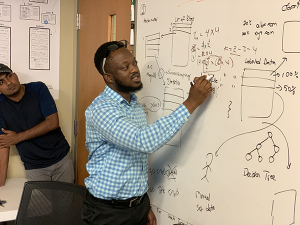On Friday, September 27th, doctoral candidate Adewale Obadimu successfully defended his PhD proposal, “Assessing the Role of Social Media Platforms in the Propagation of Toxicity.”
Obadimu defined toxicity as any “rude, disrespectful, or unreasonable comment that is likely to make people leave a discussion.” He argued that users who exhibit this toxic behavior will become worse over time, and that anyone could potentially display this type of behavior online.
His research aims to answer specific questions:

- Are toxic users clustered/segregated in an online discussion?
- Is toxicity contagious?
- Can we leverage toxic signals for predictions?
To begin his research, Obadimu focused on a sample of user comments posted on CNN’s YouTube videos. His analysis was able to reveal how the existence of toxicity and its magnitude is altered when the narrative shifts.
His preliminary work will be used as a stepping stone in a long line of future work that can be done to better understand the origin, propagation and impact of toxicity on online social media networks.
Obadimu acknowledged the issues in balancing freedom of speech with reducing harmful content. He also addressed other limitations that he plans to address in the future, along with a focus on preventive measures regarding toxicity.
“The general implications of this work are that by systematically assessing toxicity, this work sets the stage for developing a richer, more robust model for understanding the flow of toxicity on various online social media networks and for developing tools for toxicity control and prevention,” explained Obadimu.
Obadimu plans to defend his dissertation in the Fall of 2020.
About Adewale Obadimu:
Adewale Obadimu is a Ph.D. candidate in Computer Science department. He joined COSMOS research lab as a software developer. Wale earned his bachelor’s degree in computer science from Obafemi Awolowo University in Nigeria in 2013. He was a Google Student Ambassador for his previous institution, worked as a lead software developer at Health Informatics Research Laboratory and a technologist for the Center for Energy Research and Development before coming to UA Little Rock. His research interests focus on social bots. He is currently exploring machine learning and deep learning techniques because he believes the future of computing is automation.
This research at COSMOS is funded in part by the U.S. National Science Foundation, U.S. Office of Naval Research, U.S. Air Force Research Lab, U.S. Army Research Office, U.S. Defense Advanced Research Projects Agency, Arkansas Research Alliance, and the Jerry L. Maulden/Entergy Endowment at the University of Arkansas at Little Rock. Any opinions, findings, and conclusions or recommendations expressed in this material are those of the authors and do not necessarily reflect the views of the funding organizations.
